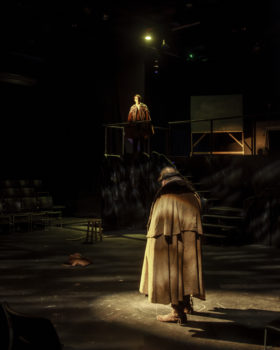
Photo by Krister Strandskov
“Playing With Fire” is a play that follows the events after the story of Frankenstein. It was performed at DMACC’s Black Box Theater the last weekend of September and the first weekend of October.
The problem with me writing an article about a month after production is that you will never see this particular production. I can tell you the plot of the play and its tiny details, which I will do. But I want to focus more on the amazing experience I had and why you should check out or even be involved with the theater program here at DMACC.
Playing With Fire,” subtitled “After Frankenstein,” was written by Barbara Field and directed by Miranda Turner. It tells the story of an unhealthy father-son relationship between Dr. Frankenstein and his monstrous creation. Dr. Frankenstein is on the hunt for his creation, filled with revenge because it strangled his wife.
He finds him but notices major differences from when he first created him. The creation is well-versed and very well-spoken, unlike the unintelligible freak that he knew of. He pulls out his weapon but doesn’t fire, due to his curiosity of learning more about his creation.
The story heavily relies on flashbacks to help the audience recount the events and to deepen the characters of Dr. Frankenstein and the creation. As they continue to recount the memories of their troubled past, we learn Dr. Frankenstein is dying.
It’s a rather heartbreaking play about a man so caught up in revenge that he can’t breathe a single breath without saying his creation’s name: “Adam,” also the name of God’s first human creation in the Bible.
I would like to share the experience I had while watching the play. Immediately when walking into the theater I realized how different the stage was. When I think of a stage for a play my brain usually drifts towards the “proscenium arch.”
The proscenium stage is where the audience is seated on one side of the stage, elevated from front to back. From the audience’s perspective, actors are seen in a two-dimensional playing view.
But here at DMACC, it is different. The Black Box Theater gives us a more immersive experience where the audience is significantly closer to the actors — we are quite literally on the same floor as them, and we are on the stage with them. The seating arrangement is similar to a four-sided arena but with one side occupied to fit a set. We get to see the actors and their different physicality because we are not just seeing them on a two-dimensional field.
As a person who wants to direct as a career, I had the privilege to talk to the director of the play, Miranda Turner. This isn’t the first time she has been involved with this field of work; she started as an actor at the age of three! Eventually, she started directing and has been for 15 years. I am a sucker for good directors and good in-depth character studies, and Turner really considered that for this play.
Every question an actor should impose on themselves when it comes to character analysis has to be the: What? When? Why? And How? Turner instilled that philosophy with the actors of the play: feel this character rather than just play it.
DMACC student Ayden Frisk, who played Dr. Frankenstein’s mentor, Professor Krempa, talks about a method where you look at every line of the character that is being played, and figure out the intent and motivation behind it.
With every actor fully understanding their characters as well as having a fully immersed experience in the Black Box Theater, it creates an atmosphere that encapsulates the audience. Being personal is a huge aspect of performance because that’s how humans are. Being close and personal is an important tool for acting because you can take it in many different directions. You can make an audience feel uncomfortable, you can make an audience empathize with you, you can make them feel happy, sad, or even angry.
Every actor in this play has nailed their part and I’m excited to see what’s to come for the Black Box Theater. If you are curious to see more of Miranda Turner’s works she is currently in production for another play she is directing called “Wicked Queen” at the Tallgrass Theatre Company in West Des Moines.
The next production coming to DMACC Ankeny is “Merge,” about the sale of Atari to Warner Bros.





Comments